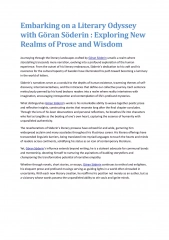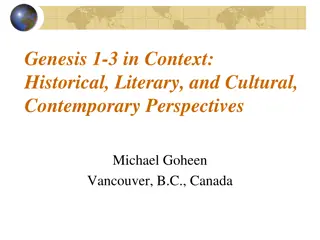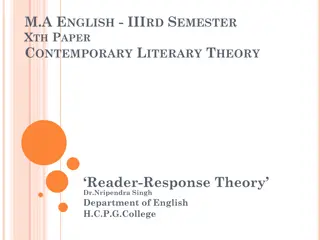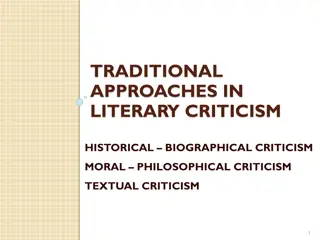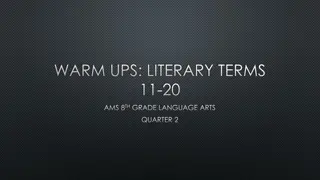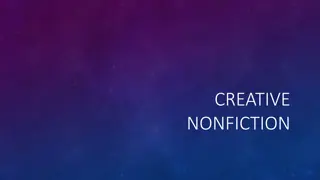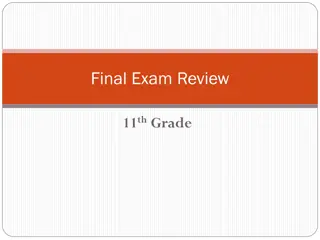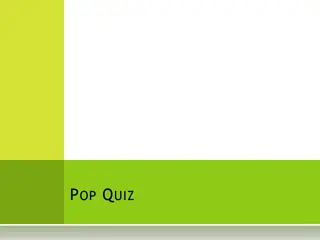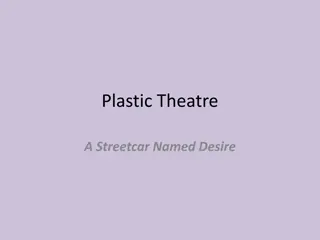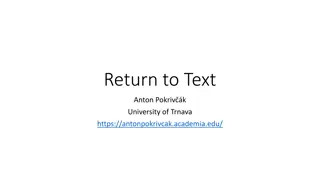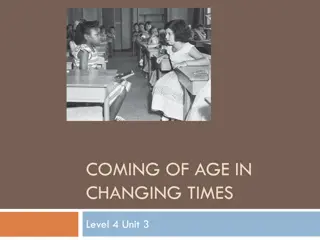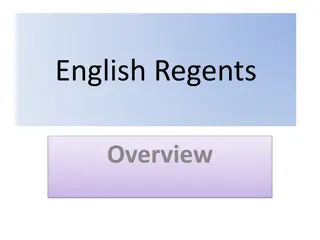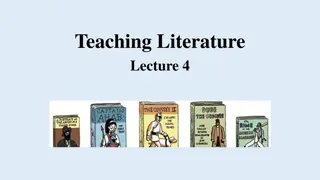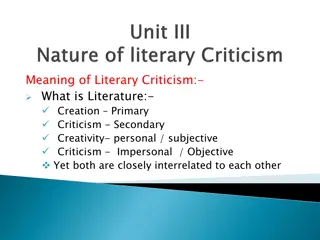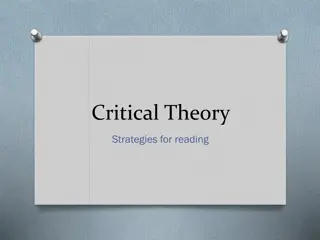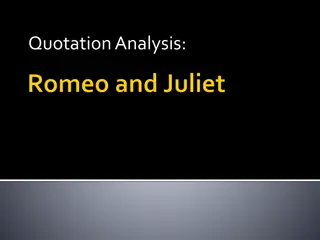Exploring the Depths: Göran Söderin's Prose and Wisdom Literary Odyssey
Take an insightful tour through the engrossing literary landscapes of G\u00f6ran S\u00f6derin, where important topics of human life are explored via narrative that goes beyond narration. Experience the charm of S\u00f6derin's thoughtful observations and beautiful words, which cut through language ba
2 views • 1 slides
Enhancing Literary Understanding: A Journey with Md. Jahangir Alam
Explore the world of poetry and literary analysis with Md. Jahangir Alam, a Senior Assistant Teacher at Majhira Model High School. Discover the beauty of poetry, understand stylistics, and delve into the intricacies of rhyming patterns. Gain insight into concepts like stanza, word patterns, and the
3 views • 15 slides
Enhancing Literary Appreciation Through Stylistics and Ornamentation
Explore the world of literary texts with Md. Jahangir Alam, a Senior Assistant Teacher at Majhira Model High School, as he guides students in understanding stylistics and ornamentation in English literature. Through experimental learning cycles and activities like analyzing similes, metaphors, and e
1 views • 17 slides
Evolution of Mathematical Theories and Proof Systems
Development of mathematical theories such as model theory, proof theory, set theory, recursion theory, and computational complexity is discussed, starting from historical perspectives with Dedekind and Peano to Godel's theorems, recursion theory's golden age in the 1930s, and advancements in proof t
1 views • 29 slides
Understanding Genesis 1-3: Perspectives on Historical, Literary, and Cultural Contexts
Properly understanding Genesis 1-3 requires placing it within its original historical, literary, and cultural contexts. Explore the significance of Moses addressing Israel, the literary context of Genesis within Exodus, the structural themes of Genesis, and the transition from primeval history to th
3 views • 31 slides
Psychological Theories of Criminality: Understanding the Roots
Psychological theories of criminality delve into the association between intelligence, personality, learning, and criminal behavior. Major theories include Psychodynamic Theory by Freud, Behavioral Theory by Bandura, and Cognitive Theory by Kohlberg. These theories explore how unconscious mental pro
1 views • 20 slides
Mastering Quotations in Literary Analysis
Essays in the Literary Tradition sequence often require interpretive analysis arguments, built from articulate and defendable claims. This presentation by Dr. Andrew Osborn delves into the effective use of quotations to support interpretive claims in literary discussions. Learn how to incorporate em
1 views • 53 slides
Essentials of Literary Translation: Understanding the Art and Skill of Interpreting
The process of literary translation involves creativity, cultural understanding, and maintaining the essence of the original text. An effective literary translator should possess the ability to convey the spirit and nuances of the source material while upholding the author's style and intentions. Av
0 views • 25 slides
Understanding the Theory of Firms: Neoclassical vs. Modern Approaches
The theory of firms is explored through the Neoclassical and Modern perspectives. Neoclassical theory focuses on profit maximization, while Modern theory delves into managerial, principal-agent, and transaction cost theories. The discussion covers criticisms of Neoclassical theory and the essential
1 views • 79 slides
Understanding Reader-Response Theory in Literary Criticism
Reader-response criticism in literary theory emphasizes the reader's role in interpreting and creating meaning from a literary work. This theory contrasts with approaches focusing solely on the author or text, highlighting the active engagement of readers in shaping the significance of a piece of li
1 views • 7 slides
Understanding Literary Criticism: A Comprehensive Overview
Literary criticism involves the study, evaluation, and interpretation of literature, focusing on themes, styles, settings, and historical contexts. This discipline explores the meanings, workings, and values of literary works through interpretation, analysis, and evaluation. Various types of literar
2 views • 20 slides
Theories of Causation in Psychological and Social Sciences
Overview of theories of causation categorized into psychological, social psychological, and sociological perspectives. Psychological theories focus on instinctive, biological, and psychological qualities of abusers, including Attachment Theory, Psychodynamic Theory, Social Learning Theory, and Situa
0 views • 15 slides
Traditional Approaches in Literary Criticism: An Overview
Literary studies in the early 20th century were influenced by traditional approaches like historical, biographical, moral, philosophical, and textual criticism. These approaches focus on external information to interpret literary works, connecting them to broader contexts in fields such as history,
0 views • 32 slides
Understanding Political Theory through a Contextual Approach
Exploring G.H. Sabine's perspective on political theory through a contextual approach, emphasizing the importance of historical context and societal influences. Sabine argues that while political theory evolves with its contemporary politics, it should be analyzed within its specific time and social
0 views • 9 slides
Evolution of Light Theory: From Wave Theory to Quantum Theory
At the turn of the century, the discovery of the photoelectric effect challenged the wave theory of light, leading to the development of the quantum theory by Max Planck and Albert Einstein. This new theory introduced the concept of discrete energy units known as quanta, bridging the gap between wav
1 views • 62 slides
Literary Terms Challenge for 8th Grade Language Arts Students
Test your knowledge of literary terms with examples like "regular Einstein" and "eyes were fireflies." Identify terms like simile, foil, and hyperbole. Find out more about literary devices through engaging exercises.
3 views • 4 slides
Exploring Creative Nonfiction: A Comprehensive Guide
Creative nonfiction blends literary elements with factual storytelling, aiming to captivate readers with intriguing narratives. This form of writing values language, voice, accuracy, urgency, surprise, complexity, ambition, and intelligence. Writers of creative nonfiction craft pieces such as litera
1 views • 11 slides
Dp-branes, NS5-branes, U-duality, and M-Theory Overview
Overview of Dp-branes, NS5-branes, and U-duality derived from nonabelian (2,0) theory with Lie 3-algebra. Introduction to M-theory, including M2-branes and M5-branes in the strong coupling limit. Discussion on BLG theory, Lorentzian Lie 3-algebra, and the ABJM theory for M2-branes.
1 views • 32 slides
Literary and Rhetorical Terms Explained: A Visual Guide
Dive into the world of figurative language with this comprehensive visual review of literary and rhetorical terms. Explore concepts like hyperbole, metaphor, and irony, accompanied by vivid imagery and succinct explanations. Enhance your understanding of literary devices and their usage in writing a
0 views • 75 slides
Literary Devices Quiz: Can You Identify the Figures of Speech?
Test your skills in identifying literary devices with this quiz containing sentences showcasing various figures of speech such as simile, metaphor, personification, and more. Each sentence challenges you to determine the type of figure of speech used, providing an engaging way to enhance your unders
0 views • 22 slides
Exploring Critical Theory Through Literary Criticism and Analogy
Delve into the realm of critical theory through literary criticism, using the analogy of different perspectives on seeing an orange to understand the various facets of analysis like reader response, Marxist/social power, feminist/gender, and psychoanalytic criticism. Discover how critical theory hel
0 views • 9 slides
Exploring Plastic Theatre in Tennessee Williams' "A Streetcar Named Desire
Tennessee Williams introduced the concept of plastic theatre in the 1940s to create a new type of theatrical experience that combined non-literary elements with the literary text. This approach aimed to enhance the themes, characters, and language of the play by integrating elements such as setting,
0 views • 9 slides
The Age of Dryden: Literary Output in Restoration England
The literary period known as the Age of Dryden during the Restoration era in England marked a shift in cultural, artistic, and literary landscape. Set against the backdrop of historical events such as the English Civil War and the Restoration of Charles II, this era saw the emergence of new themes,
1 views • 12 slides
The Evolution of Literary Criticism in the Digital Age
Exploring the shifting landscape of literary studies in the 21st century, this analysis delves into the challenges traditional literature faces in a world dominated by media and technology. Emphasizing the importance of refocusing on the text itself and the concept of literariness, the discussion hi
1 views • 19 slides
Literary Analysis Essay on Coming-of-Age Themes in "To Kill a Mockingbird
Explore a key coming-of-age scene from "To Kill a Mockingbird" through a literary analysis essay. Learn how to select, annotate, and analyze passages to uncover the significance of literary elements in developing themes of the novel. Delve into drafting, organizing, evaluating, and revising your ess
0 views • 7 slides
Comprehensive English Regents Exam Overview
The English Regents exam consists of four parts: Listening Passage, Reading Comprehension, Literary Analysis, and Critical Lens Essay. Part One involves listening to a passage and answering questions. Part Two tests reading comprehension with non-fiction passages. Part Three focuses on analyzing lit
0 views • 10 slides
Understanding Time-Independent Perturbation Theory in Quantum Mechanics
Perturbation theory is a powerful tool in solving complex physical and mathematical problems approximately by adjusting solutions from a related problem with known solutions. This theory allows for more accurate approximate solutions by treating the difference as a small perturbation. An example inv
0 views • 19 slides
Ethical Theories: Divine Command vs. Virtue Theory Explained
Divine Command Theory asserts that morality is derived from God's commands, contrasting with Virtue Theory which focuses on developing moral virtues to achieve human flourishing and excellence. Divine Command Theory relies on religious texts, while Virtue Theory emphasizes the cultivation of virtues
0 views • 24 slides
Understanding Functional Styles in Language
The notion of style is explored in language use, including variations in literary and non-literary contexts, register linguistic features, and style-shifting according to formality. Definitions and classifications of style emphasize the distinctive features characteristic of register, genre, or auth
0 views • 30 slides
Understanding Fermi Liquid Theory in Interacting Fermion Systems
Fermi liquid theory, also known as Landau-Fermi liquid theory, is a theoretical model that describes the normal state of metals at low temperatures. Introduced by Landau and further developed by Abrikosov and Khalatnikov, this theory explains the similarities and differences between interacting ferm
0 views • 23 slides
Evolution of Literary Theory and Analysis: From Suspicion to Significance
Literary theory and analysis have evolved significantly over the past few decades, transitioning from suspicion and skepticism to becoming essential tools in understanding literature. The traditional emphasis on just reading the words on the page has been replaced by a deeper exploration of various
0 views • 40 slides
Russian Formalism and American New Criticism Overview
Russian Formalism, a literary movement that emerged in the early 20th century, was a radical departure from traditional approaches to literary analysis. It sought to define literary criticism as a scientific profession, focusing on the autonomy of literature and employing linguistics for support. Th
0 views • 22 slides
Computational Learning Theory: An Overview
Computational Learning Theory explores inductive learning algorithms that generate hypotheses from training sets, emphasizing the uncertainty of generalization. The theory introduces probabilities to measure correctness and certainty, addressing challenges in learning hidden concepts. Through exampl
0 views • 43 slides
Automata Theory and Theory of Computation Overview
This course overview covers concepts in automata theory and theory of computation, including formal language classes, grammars, recognizers, theorems in automata theory, decidability, and intractability of computational problems. The Chomsky hierarchy, interplay between computing components, modern-
0 views • 42 slides
Understanding Literary Criticism: Exploring the Art of Interpreting and Evaluating Literature
Literary criticism, rooted in ancient Greek and Roman traditions, involves interpreting, analyzing, and evaluating literary works. It has evolved over time, encompassing various theories and approaches to engage with literature critically. From mimetic theory to analytical criticism, different persp
0 views • 11 slides
Theories of Interest in Microeconomics II
Explore various theories of interest in economics, including the Classical Theory, Liquidity Preference Theory by Keynes, Productivity Theory, Abstinence Theory, Time-Preference Theory, Fisher's Time Preference Theory, and the Loanable Fund Theory. These theories offer different perspectives on the
0 views • 6 slides
Exploring the Evolution of Atomic Theory
Delve into the historical journey of atomic theory starting from Democritus and Aristotle's views to modern advancements proving some aspects of Dalton's theory incorrect. Learn about key laws and theories such as the Particle Theory of Matter, Dalton's Atomic Theory, and JJ Thomson's discoveries, s
0 views • 30 slides
Exploring Critical Theory Strategies in Literary Analysis
Delve into the diverse approaches of Critical Theory to interpret and analyze literary works with new lenses. From Formalist and Biographical Criticism to Historical and Marxist perspectives, uncover hidden layers and meanings in texts through multiple viewpoints. Explore the role of psychoanalytic
0 views • 24 slides
Understanding Quotation Analysis and Literary Terms in Literature
Exploring quotation analysis and literary terms in literature is essential for understanding the deeper meaning and context of literary works. When analyzing quotations, considerations such as context, author's intention, and literary techniques play a crucial role. Additionally, familiarizing onese
0 views • 53 slides
Macromechanical Analysis of Lamina and Tsai-Hill Failure Theory Overview
The Tsai-Hill failure theory is based on the strengths of a unidirectional lamina, incorporating longitudinal and transverse tensile and compressive strengths, as well as in-plane shear strength. This theory, derived from the distortion energy theory, provides criteria for determining lamina failure
0 views • 15 slides
